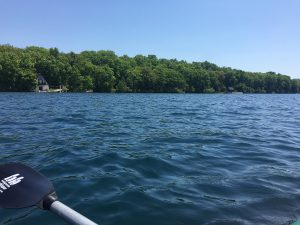
Exploring Gull Lake with a KBS kayak
Kellogg Biological Station (KBS) 2018 undergraduate summer researcher, Brian Lerch, is a junior at Case Western Reserve University and Biology and Mathematics major. He wrote about his KBS Research Experiences for Undergraduates (REU) project working with the Klausmeier Lab.
Arriving at the Kellogg Biological Station (KBS), I didn’t know what to expect. I was confident in my ability to be a valuable member of a research team but much less confident in how I would feel about living in rural Michigan for eleven weeks. Going in, I thought that it was good I was only a four-hour drive from home, a drive I thought I would make frequently on the weekends. I could not have been more wrong! As I reminisce on the summer, I find it hard to believe how quickly the time had gone.
I joined the Klausmeier Lab eager to embark on a new research project. It was immediately apparent that the lab would be a good fit for me. Together, we began to dive into potential research topics. At this stage, most of my time was spent reading. Our goal was to develop a project studying community ecology from a theoretical perspective, which certainly left things wide open. After a couple of weeks, we began narrowing our focus. We decided to try to build an all-encompassing model of meta-communities, which Dr. Klausmeier dubbed the “uber model”.
It’s probably not surprising given the name because building such a model is no small task. Figuring out how to set-up the model in the computer, and power needed to make progress, challenges were plentiful. The ultimate goal was a two-species and two-patch type model. We first built a two-species one-patch type model (mc21) and a single species two-patch type model (mc12). I took over devising mc21 and my lab partner was in charge of mc12. Our job moved gradually from reading to coding. Here, we encountered more trouble in speeding up simulations. This led Dr. Klausmeier to suggest we code in FORTRAN—a language neither my lab partner nor myself had any experience understanding.
By this point, I really began to feel as if I was in uncharted territory. Although I have quite a bit of experience in theoretical ecology, I entered the summer without much knowledge of community ecology. Couple this with a new program and numerical challenges I had yet to deal with, and I was in for a challenging ride. The challenge had been quite rewarding, as I now feel I have expanded my knowledge into a new realm of ecology and picked up valuable coding skills along the way.
Unfortunately, as the summer came to an end, we had yet to get to the uber model. Bogged down by computational challenges in mc21 and mc12, we only begun to consider the unification of the two models. Still, we have four people very interested in the uber model and I am very optimistic that we can continue to progress our research even after leaving KBS.
Now, as I finish writing about the lessons of the summer, I find it hard to believe all that has happened. Certainly, I learned basic scientific skills and expanded my scientific knowledge, but that is far from what I will take from this experience the most. I had to work in direct collaboration with another undergraduate for the first time in my research career. Such a team dynamic has been a fruitful experience in and of itself. Personally, the time I’ve spent on the lake and the friends I’ve made along the way have greatly affected what my journey at KBS has been. I am extremely lucky and grateful to have met such people and gotten the experiences that KBS has offered me.

A legacy of conservation; a commitment to sustainability.
3700 E. Gull Lake Drive
Hickory Corners, MI 49060
(269) 671-5117
info@kbs.msu.edu